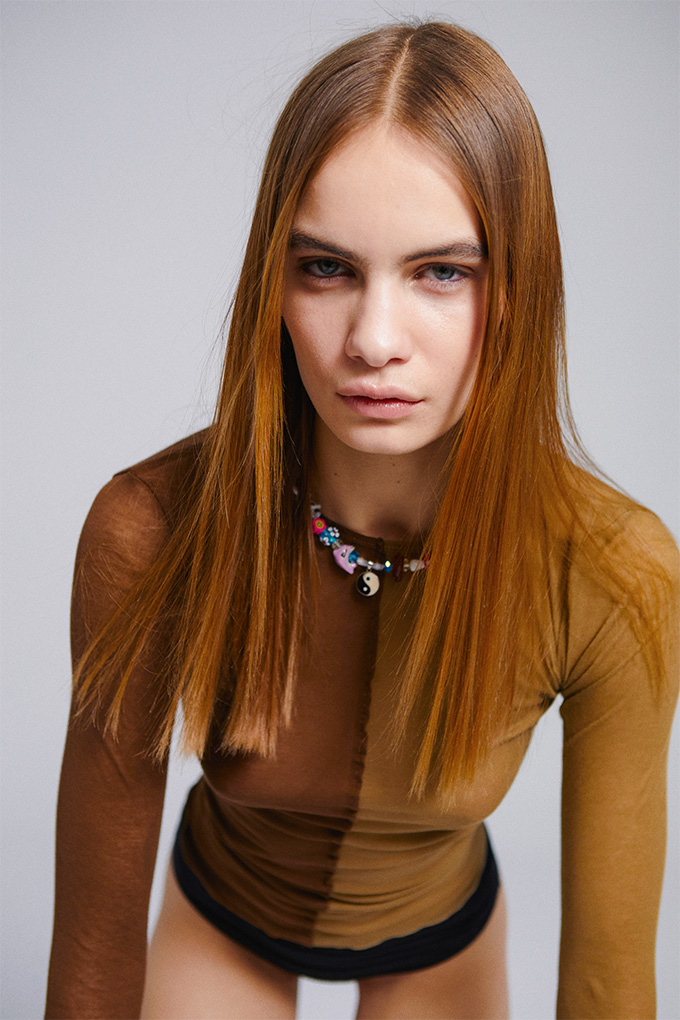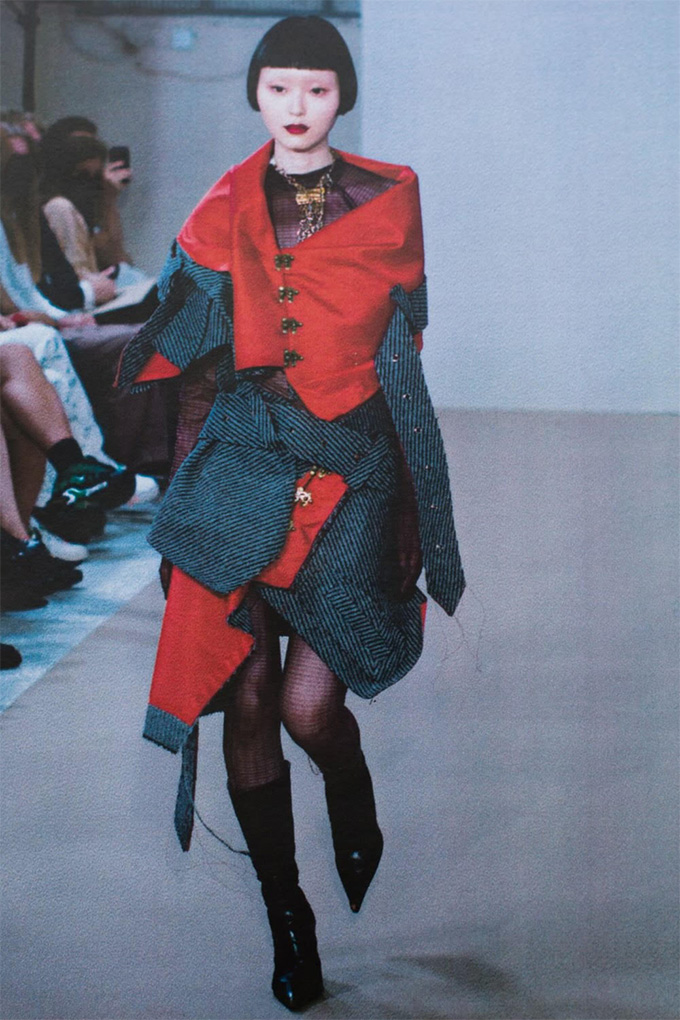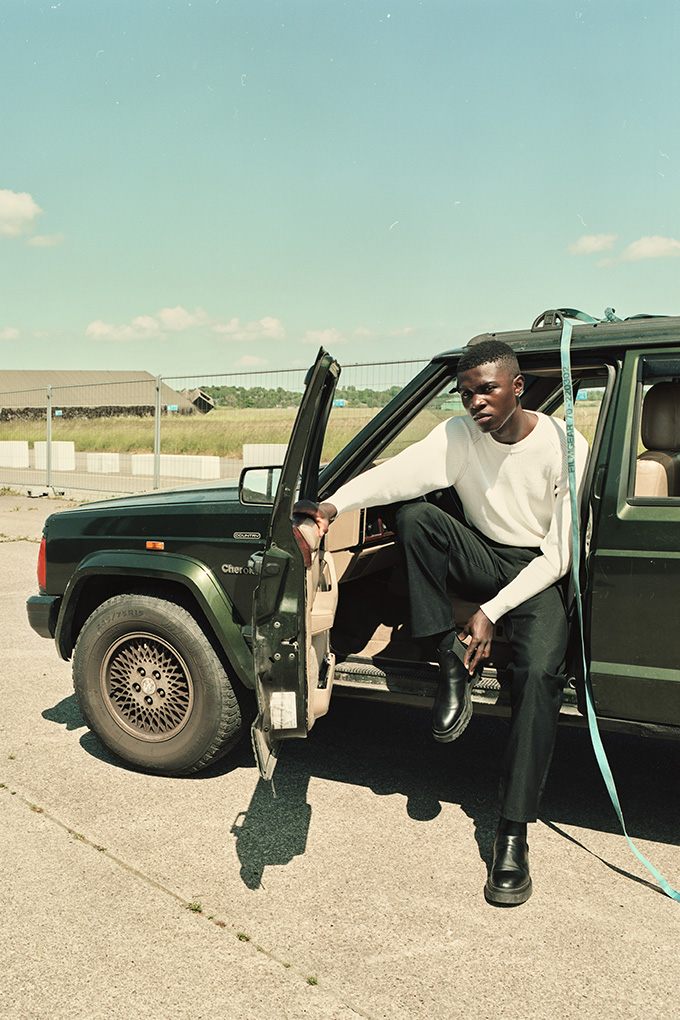From Ganni to Stine Goya, Brøgger and Saks Potts, Copenhagen Fashion Week is never short of big-name draws who have become synonymous with Scandi fashion. But, a renewed focus on emerging talent this season means a new generation of designers are shaking up the schedule, with many of them taking a fresh approach to sustainability.
“What excites me the most about our new talents is that, for many, integrating sustainability in their design approach and collections is part of their very core values and not a matter to be questioned,” Cecilie Thorsmark, CEO of Copenhagen Fashion Week, tells Vogue. “Through these young voices, we can showcase a different take on the aesthetics of garments made responsibly, which is so necessary in order to break away from presumptions about how sustainability can be translated into fashion.”
From the new labels championing Scandi minimalism to designers who are pushing the boundaries of knitwear, we speak to five rising brands at Copenhagen Fashion Week SS22.
(Di)vision

With the likes of Kendall Jenner and Mona Tougaard already among its fans, (Di)vision is the new streetwear brand to have on your radar. Founded by siblings Nanna and Simon Wick in 2018, the label has quickly become known for its upcycled designs, including reworked bomber jackets, vintage T-shirts, patchwork bucket hats and lounge pants.
What was your starting point for this collection?
Simon Wick (SW): “The first thing we do when creating a collection is sourcing the fabric, and from that we create the styles. We kind of reverse the [traditional] way of designing because we don’t know what fabrics we’re going to get our hands on. Everything we do has to be created from what already exists.”
Why is upcycling so key to your brand’s DNA?
Nanna Wick (NW): “I think for both of us it came really naturally. It was easier to source all of these cool vintage T-shirts, rather than just buying new fabric. We didn’t have that much money when we started out, so we would just take old clothes we had in our closets and do prototypes.”
SW: “We’re aware that we are putting more clothes into a world that’s already filled with clothes, but the best way for us to work around that is [by upcycling]. For us it was a no-brainer.”
How does it feel to already have such high-profile fans?
NW: “It’s amazing. It’s so fun to see the stuff you create suddenly go out into the world and have its own life.”
Louise Lyngh Bjerregaard

Eckhaus Latta alumna Louise Lyngh Bjerregaard seeks to push the boundaries of knitwear via her sculptural designs. Debuting her AW22 collection during Paris Couture Week in July, the Central Saint Martins graduate places a strong emphasis on craftsmanship, as well as sustainability.
What was your approach for this debut collection?
“It is my first collection, and who knows how many collections you get to make — so for me, I just wanted to show what I’m capable of. What does knitwear look like when it comes from me? How can I challenge myself to make it better?”
Where does your love of knitwear come from?
“That’s a really difficult question, because where does love come from in general? You can’t really predict it. I love the patience you need to have [for knitwear]; I love the fact that you can create your own textile. It requires a lot of attention to detail, you need to get into it and forget about the world for a second.”
What does sustainability mean to you?
“Our approach is to reuse everything; rethink everything. I have a huge ball gown that uses leftover leather from some pants that we sewed together. Some of the knitted pieces are from unpicked yarn, then around 60 per cent of the collection is pure deadstock. For me, as a designer, sustainability is as important as the ability to create good clothing. You [can’t] have a sustainable brand but not make good clothing, or make good clothing but not be sustainable.”
The Garment

Founded by stylist Sophia Roe and designer Charlotte Eskildsen (who is also co-founder of Designers Remix) in 2020, The Garment takes a minimalist approach to sustainability. In their words, this means: “Owning less by buying right.”
How would you describe your brand’s aesthetic?
“Very minimalistic and personal. We design for a woman who searches for a wardrobe with substance and longevity.”
Tell us about some of your sustainable practices?
“Taking care and acting responsibly are our two core values. By supporting nature projects in Peru, Kenya and Cambodia, we carbon offset the climate impact of each product we produce. We constantly strive to find and select responsibly sourced materials, as the choice of materials is a significant way to reduce our climate impact. The Garment is also a leather and fur-free brand.”
Where do you see the brand going next?
“We started the brand during the pandemic—so we are definitely looking forward to meeting our customers in person. We have pop-ups in the coming season with Luisaviaroma and Printemps, so we are very excited.”
A. Roege Hove

Since launching her eponymous label in 2019, Amalie Røge Hove Geertsen has become known for her signature bodycon knits, designed for a range of shapes and sizes. The Royal Danish Academy graduate has been awarded the inaugural Talent Slot at Copenhagen Fashion Week SS22.
How do you begin your creative process?
“It very much starts at the knitting machine. I don’t really draw the designs—I imagine these combinations in my head, try them out on the machine and then develop from there. It’s about creating silhouettes [that] transform when you put them on the body.”
Why is inclusivity important for your work?
“It’s important for me to show my clothes on different [types of] women. If you see my show and think, ‘Okay I could imagine myself wearing that’ because it’s on a certain body type or skin tone, that would be really good. It’s probably something the shows in Copenhagen need to improve on. I really want to show future generations that we need to be more inclusive.”
How do you see yourself and your peers approaching design for the future?
“One of the main things is really trying to create products that we’re really good at. A lot of new brands on the schedule are great in the way that they choose one thing [to focus on]. It would be super nice to show that a fashion brand doesn’t need to be everything.”
Berner Kühl

Polimoda graduate Frederik Berner Kühl launched his eponymous menswear label in 2019 with one main aim: to create good products. Focusing on utility, the brand delivers eco-conscious basics that are designed to last.
What is the inspiration behind your SS22 collection?
“In the beginning, I was very inspired by a movement in Italy in the ’60s called Arte Povera–a group of artists making great art by using what they had to hand. One artist, Mario Merz, worked a lot on igloos, creating shelter. Shelter is an idea that I also work with a lot, both practically and in terms of what clothing can do for you in a more figurative way.”
How do you approach sustainability?
“For me, a product has three parts: how it is born, how it lives and how it dies. There are a lot of different ways to approach sustainability—you can use recycled materials, you can buy deadstock—so, it’s about bringing all these things together. What we can do as a brand is to support innovation; that’s really where I think we have a chance to do better and create better products.”
What’s next for your brand?
“I want to get better season by season, both product-wise and in terms of the set-up around the brand. I’d like the brand to be big enough to manage, but also small enough to keep innovating.”





